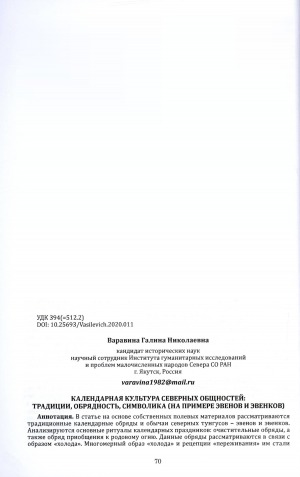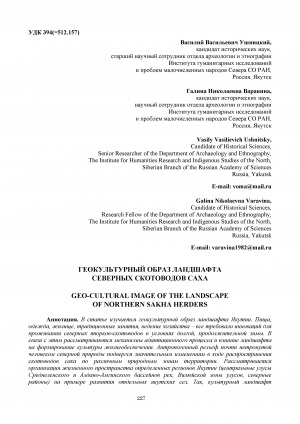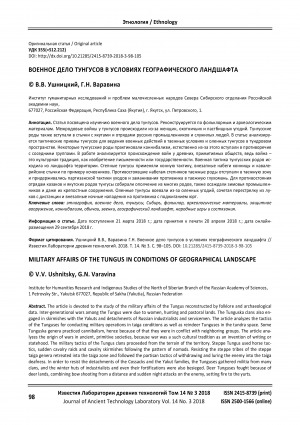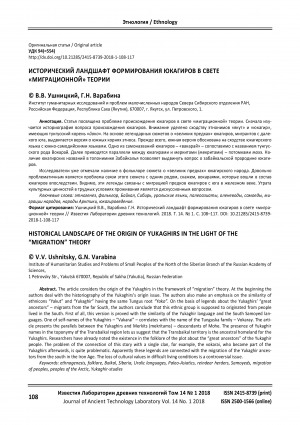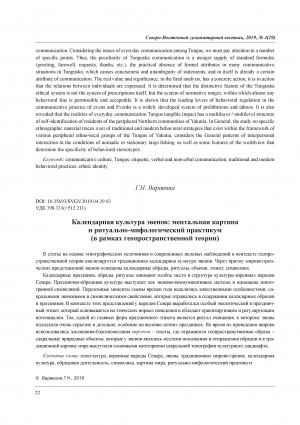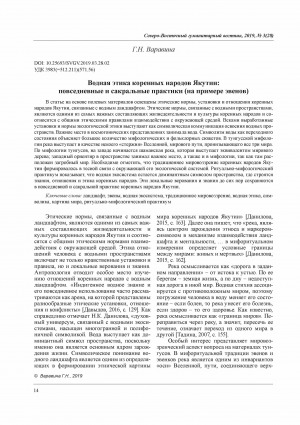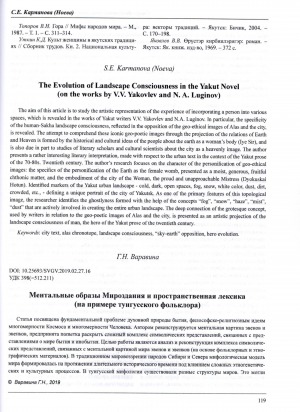Место работы автора, адрес/электронная почта: Институт гуманитарных исследований и проблем малочисленных народов Севера, Отдел археологии и этнографии ; 677027, г. Якутск, ул. Петровского, 1 ; e-mail: varavina1982@mail.ru ; http://igi.ysn.ru
Ученая степень, ученое звание: канд. ист. наук
Область научных интересов: Традиционная культура народов Севера
ID Автора: SPIN-код: 1766-9500, РИНЦ AuthorID: 611413
Деятельность: С 2004 г. работает в Институте проблем малочисленных народов Севера СО РАН.
Количество страниц: 5 с.
- Общественные науки. Образование > Этнография. Обычаи. Жизнь народа. Нравы,
- НАУКА ЯКУТИИ > ОБЩЕСТВЕННЫЕ НАУКИ > Этнография. Обычаи. Жизнь народа. Нравы,
- КНИГАКАН > Все народы > Эвенки (тунгусо-маньчжурская группа языков) > Этнография. Фольклор,
- КНИГАКАН > Все народы > Эвены (тунгусо-маньчжурская группа языков) > Этнография. Фольклор.
The article, based on its own field materials, examines the traditional calendar rites and customs of the northern Tungus - Evens and Evenks. The main rituals of calendar holidays are analyzed: cleansing rites, as well as the rite of admission to the birth fire. These rites are considered with the image of "cold.” The multidimensional image of "cold” and the reception of "experience" he became important concepts of the cultural heritage of northern communities, as a complex multifunctional system: this is both symbolic practice and unique ecological traditions associated with cold, and "life and natural scenarios." The traditional worldview, the mental picture of the world of the indigenous peoples of the North was formed in close connection with the environmental system surrounding it. For centuries, the developed mental values and attitudes associated with the northern ecosystem have acted as a symbolic communication for the development of harsh spaces. These standards of environmental ethics are one of the most important components of indigenous peoples’ lives and cultures and relate to the general ethical principles of interaction with the environment. These unique knowledge and local beliefs are still preserved in the daily and sacred practices of the indigenous peoples of the North. So, on the basis of modern field observations, etiquette settings in the festive space, as well as a culture of hospitality among Evens and Evenks, are considered. In the article in the framework of cognitive semiotics, the author analyzed the value settings and the sign-symbolic program of communicative and behavioral strategies of the Tungus, which acted as an ethnic component of the image of the "northern person" and the "cold world." It was revealed that it was the concepts associated with the cold that formulated the main postulates of the culture of hospitality. So, it is revealed as an antipode of the "cold world” - "warm” hospitality, in which the main constants are the rituals of meeting and honoring the guest. Analysis of local texts of culture (iconic places, holidays and rites, ritual, folklore, etc.) shows the semantic connection of the mythoric world with the natural landscape, which is based on ethical standards of behavior and has guiding and regulatory potential.
Варавина, Г. Н.
Календарная культура северных общностей: традиции, обрядность, символика (на примере эвенов и эвенков) / Варавина Г. Н. ; Институт гуманитарных исследований и проблем малочисленных народов Севера СО РАН // Народы и культуры Северной Азии в контексте научного наследия Г. М. Василевич : сборник научных статей / ответственный редактор Л. И. Миссонова ; редакционная коллегия: А. Н. Варламов, Н. И. Данилова, Е. Г. Маклашова [и др.] ; рецензенты: Т. В. Аргунова, Т. Г. Басангова, В. Н. Давыдов ; ответственный за выпуск М. П. Дьяконова. - Якутск : ИГИиПМНС СОРАН, 2020. - С. 70-74. - DOI: 10.25693/VasiIevich.2020.011
DOI: 10.25693/VasiIevich.2020.011
Количество страниц: 8 с.
Ушницкий, В. В. Геокультурный образ ландшафта северных скотоводов саха / В. В. Ушницкий, Г. Н. Варавина ; Институт гуманитарных исследований и проблем малочисленных народов Севера СО РАН // Коренные малочисленные народы Российской Федерации: проблемы, приоритеты и перспективы развития в трансформирующемся обществе / редакционная коллегия: С. М. Баишева (автор предисловия), А. Г. Томаска ; рецензенты: У. С. Борисова, Н. И. Данилова. - Якутск : ИГИиПМНС СО РАН, 2019. - С. 227-232
Количество страниц: 12 с.
Варавина, Г. Н. Календарь эвенов Якутии: этноэкологические традиции и обряды / Г. Н. Варавина // Гуманитарные науки в Якутии: исследования молодых ученых. - 2020. - С. 51-62.
Количество страниц: 8 с.
- Общественные науки. Образование > Государственное административное управление. Военное дело > Военное искусство. Военные науки. Оборона страны. Вооруженные силы,
- НАУКА ЯКУТИИ > ОБЩЕСТВЕННЫЕ НАУКИ > Государственное административное управление. Военное дело,
- КНИГАКАН > Все народы > Эвенки (тунгусо-маньчжурская группа языков) > Этнография. Фольклор.
Ушницкий, В. В. Военное дело тунгусов в условиях географического ландшафта / В. В. Ушницкий, Г. Н. Варавина // Известия лаборатории древних технологий. — 2018. — Т. 14, Вып. 3 (28). — С. 98-105. — DOI: 10.21285/2415-8739-2018-3-98-105.
DOI: 10.21285/2415-8739-2018-3-98-105
Количество страниц: 10 с.
- Этногенез народов Якутии > Этногенез коренных малочисленных народов Севера,
- Общественные науки. Образование > Этнография. Обычаи. Жизнь народа. Нравы,
- Краеведение. Археология. География. Биографии. История > Историческая наука. Историография > Всеобщая история. История отдельных стран и народов,
- Краеведение. Археология. География. Биографии. История > Историческая наука. Историография > История Якутии,
- НАУКА ЯКУТИИ > ОБЩЕСТВЕННЫЕ НАУКИ > Этнография. Обычаи. Жизнь народа. Нравы,
- НАУКА ЯКУТИИ > КРАЕВЕДЕНИЕ. ГЕОГРАФИЯ. БИОГРАФИИ. ИСТОРИЯ > Историческая наука. Историография > Всеобщая история > История Якутии,
- КНИГАКАН > Все народы > Юкагиры (палеоазиатская группа языков) > Этнография. Фольклор.
Ушницкий, В. В. Исторический ландшафт формирования юкагиров в свете "миграционной" теории / В. В. Ушницкий, Г. Н. Варабина // Известия лаборатории древних технологий. — 2018. — Т. 14, Вып. 1 (26). — С. 108-117. — DOI: 10.21285/2415-8739-2018-1-108-117.
DOI: 10.21285/2415-8739-2018-1-108-117
Количество страниц: 14 с.
Варавина Г. Н. Календарная культура эвенов: ментальная картина и ритуально-мифологический практикум (в рамках геопространственной теории) / Г. Н. Варавина // Северо-Восточный гуманитарный вестник. - 2019. - N 4 (29). - С. 22-35. – DOI: 10.25693/SVGV.2019.04.29.03.
DOI: 10.25693/SVGV.2019.04.29.03
Количество страниц: 6 с.
Варавина Г. Н. Водная этика коренных народов Якутии: повседневные и сакральные практики (на примере эвенов) / Г. Н. Варавина // Северо-Восточный гуманитарный вестник. - 2019. - N 3 (28). - С. 14-19.
DOI: 10.25693/SVGV.2019.03.28.02
Количество страниц: 10 с.
Article is devoted to a fundamental problem of the spiritual nature of life, the philosophical and religious ideas of multidimcnsionality of Space and multidimcnsionality of the Person. The author reconstructs a mental picture of Evens and Evenks, an attempt to open a difficult complex of the symbolical representations connected with ideas of the world of being and non-being is made. The aim of work is the analysis and reconstruction of a complex of the symbolical representations connected with a mental picture of the world of Evens and Evenks (on the basis of folklore and ethnographic materials). In traditional outlook of the people of Siberia and the North the mythological model of the world was formed throughout progressive historical tense under the influence of difficult ethno-gcnetic and cultural processes. In the Tungus mythology there were different structures of the worlds. It could be many-tier layers of the top world and the horizontal worlds of the dead where life proceeded in the opposite direction. In general the mythology and folklore of Evens and Evenks is huge, peculiar and very interesting world in w hich ideas of the world of being and non-being, a mental picture of traditional societies arc embodied. In this foreshortening the choice of a subject as an ethnographic object of a research defined its wide cross-disciplinary methodological discourse. It is important to emphasize that in the work we expand borders of research space, actively using methodology of the modem humanities: symbolical anthropology, cultural linguistics, cognitive linguistics, semiotics. In general studying of mythological and folklore heritage shows that in XIX - the beginning of the 20th centuries Evens and Evenks, had difficult beliefs and representations which consisted of various remnants of cults, shaman view s and categories of Christian culture.
Варавина, Г. Н. Ментальные образы Мироиздания и пространственная лексика. (на примере тунгусского фольклора) / Г. Н. Варавина // Северо-Восточный гуманитарный вестник. — 2019. — N 2 (27). — С. 119-128.
DOI: 10.25693/SVGV.2019.02.27.16
